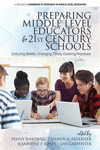
Preparing Middle Level Educators for 21st Century Schools
Enduring Beliefs, Changing Times, Evolving Practices
Edited by:
Penny B. Howell, University of Louisville
Shawn A. Faulkner, Northern Kentucky University
Jeanneine Jones, University of North Carolina at Charlotte
Jan Carpenter, Maryhurst University
A volume in the series: The Handbook of Research in Middle Level Education. Editor(s): Steven B. Mertens, Illinois State University. Micki M. Caskey, Portland State University.
Published 2018
Over the last decade, significant changes have occurred in how schools are organized, how educators are prepared and certified, how accreditation policies have shifted both curriculum and content, as well as changes to the demographics of middle school classrooms. This volume, Preparing Middle Level Educators for 21st Century Schools: Enduring Beliefs, Changing Times, Evolving Practices provides a review of current research focused on middle level educator preparation at all levels. Our enduring beliefs about young adolescents have not changed (e.g., need for developmentally responsive instruction, caring adults who understand them and are prepared to teach them, opportunities to explore their interests) but the political and sociocultural climate of schools and schooling has. In light of changing times, this volume allows researchers and teacher educators to share research from their context and inform the evolving practices of educator preparation for the middle level.
The research presented in this volume is organized into three sections, with an introduction provided for each. The authors grounded their work in the Association for Middle Level Education’s teacher preparation standards (2012) and tenets of This We Believe (NMSA, 2010). By doing so, they examine topics that hold potential for meeting the learning needs of teachers and students in middle level schools. The first section includes chapters from individuals working to ensure that the enduring beliefs of middle level education continue to guide the structures of their middle level teacher preparation programs. The second set of chapters closely examines how changing times are shaping the work of teacher educators. Finally, the last section spotlights evolving practices that continue to develop in response to the changes impacting our classrooms, schools, and communities.
This text provides readers with researched-based practices and information to help them continue the tradition of middle level teacher education. The enduring beliefs of preparing teachers who understand, respect, and honor the many talents, gifts, and contributions of the young adolescent student will guide teacher educators as they respond to the changing times of education and the evolving practices of teachers, teacher educators, and schools.
CONTENTS
Foreword. Introduction. SECTION I: ENDURING BELIEFS OF MIDDLE LEVEL EDUCATION. Tensions of Developing an Exemplary Middle Grades Teacher Preparation Program, Hilary G. Conklin and Mindy Kalchman. Preparing Middle Level Teachers for the Classroom: Assessing Efficacy and Confidence in Preservice Teacher Candidates, Steven B. Mertens. Other Duties as Assigned: The Evolution of Middle Grades Teacher Candidates’ Beliefs About Teaching, Matthew J. Moulton, P. Gayle Andrews, and Katherine F. Thompson. New Teacher Induction: The Experiences of Six Middle Level Teachers, Chris M. Cook, Mike DiCicco, and Shawn A. Faulkner. SECTION II: CHANGING TIMES IN MIDDLE LEVEL TEACHER EDUCATION. A Collaborative Approach to Supporting Middle Childhood Social Justice Teacher Education, Lisa M. Harrison, Theda Gibbs, Danielle Dani, Mike Kopish, Matt Felton, Katharine Sprecher, and Perianne Bates. A Balancing Act in the Age of edTPA: Places, Cultures, and Assessment in Middle Childhood Teacher Education, Tami Augustine and Jason Harshman. Looking Within: Teacher Critical Self-Reflection on Language and Cultural Integration in Multilingual Middle Level Schools, Katie Brooks, Susan R. Adams, and Brooke Kandel-Cisco. Promoting Community and Core Practices in a Multisite Middle Level Mathematics Program, David Slavit, Allison deVincenzi, Tariq Akmal, and Kristin Lesseig. Advocating for Increased Use of Digital Literacies for Future Middle School Teachers for Literacy Instruction, Francine Falk-Ross and Roberta Linder. SECTION III: EVOLVING PRACTICES FOR PREPARING MIDDLE LEVEL TEACHER EDUCATORS. Middle Grades Teachers’ Dispositions in Personalized Learning Environments, Penny Bishop, John Downes, Steven Netcoh, Jessica DeMink-Carthew, Katy Farber, Life LeGeros, and Tricia Stokes. Community-Based Service Learning: Building Preservice Teachers’ Confidence to Work in the Middle Years, Katherine Main. “It Was Like We Were There”: Middle Level Educators’ Experience Employing a Classroom Drama Technique, Ross C. Anderson and Nate K. Beard. Professed vs. Enacted Beliefs About Responsive Science Teaching: Three Cases From a Practice-Based Middle Level Teacher Certification Program, Daniel M. Levin, Alexander K. Chumbley, Hannah E. Jardine, Dana L. Grosser-Clarkson, and Andrew Elby. Focusing on Moves-Based Formative Assessment to Increase Equity of Voice in Middle School Mathematics: A Case for Video-Based Professional Development, Brent Duckor, Carrie Holmberg, and Joanne Rossi Becker. Dispositional, Relational, and Practical Aspects of Professional Learning for Middle Level Educators, David C. Virtue. About the Editors. About the Contributors.
-
Paperback9781641133142
Web price: $62.04 (Reg. 72.99)
-
Hardcover9781641133159
Web price: $89.24 (Reg. 104.99)
- eBook9781641133166

- EDU029000 - EDUCATION: TEACHING METHODS & MATERIALS: General
- EDU046000 - EDUCATION: Professional Development
- EDU037000 - EDUCATION: Research
-
 An International Look at Educating Young Adolescents
An International Look at Educating Young Adolescents
-
 Common Planning Time in Middle Level Schools
Research Studies from the MLER SIG’s National Project
Common Planning Time in Middle Level Schools
Research Studies from the MLER SIG’s National Project
-
 Curriculum, Instruction, and Assessment
Intersecting New Needs and New Approaches
Curriculum, Instruction, and Assessment
Intersecting New Needs and New Approaches
-
 Equity & Cultural Responsiveness in the Middle Grades
Equity & Cultural Responsiveness in the Middle Grades
-
 Health and Well-Being in the Middle Grades
Research for Effective Middle Level Education
Health and Well-Being in the Middle Grades
Research for Effective Middle Level Education
-
 Research on Teaching and Learning with the Literacies of Young Adolescents
Research on Teaching and Learning with the Literacies of Young Adolescents
-
 Voices from the Middle
Narrative Inquiry By, For and About the Middle Level Community
Voices from the Middle
Narrative Inquiry By, For and About the Middle Level Community

